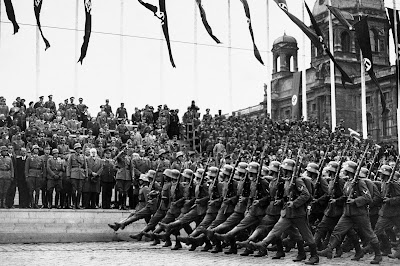Following the Nazi invasion of his city--Vienna, Austria--Dr. Richard Neumann, textile entrepreneur and art collector of Jewish descent, left his home and, with his wife, Alice, moved to Paris in 1938. They brought with them 38 paintings from their extensive art collection, fully expecting to return to Vienna once hostilities had ended.
Five years later, they were forced to flee Paris, as well, this time leaving behind nearly all of their possessions and money. Here is the story of their escape (part one of four), written by Dr. Neumann after his arrival in Cuba, detailing the harrowing journey, and the many dangers of occupied France. It is shared with the permission of his family.
Dr. Neumann and his art collection are the subject of WAM's ongoing exhibition, "What the Nazis Stole from Richard Neumann (and the Search to Get it Back)" on view through January 2022.
--
Each day in Paris brought more alarming news. Arrests, deportations, confiscations of property gave no end of worry for the immigrants. Each day one or another of our many acquaintances disappeared without explanation. For a long time I refused to allow myself to think of leaving Paris, but now I had given in and begun to explore the possibilities. Very quickly, I discovered that obtaining official permission for a legal departure was impossible...
 |
| Richard Neumann, photographed in Vienna before WWII |
[The Neumanns eventually made arrangements with a young man, Mr. P., from the south of France, who promised to take them safely by automobile to the unoccupied territory in Vichy, France]
He told us that we could send our large trunk to the address of his father in the unoccupied zone, but on no account to include any kind of valuables with it. As personal baggage he allowed us only small hand luggage.
We left on Friday evening from the Gare d’Austerlitz in Paris. The compartment was full, but we had numbered seats and the trip went quite normally. We had as much cash as possible with us, —which we obtained, unfortunately, partly through the below-market sale of some our valuable art objects—since we saw little opportunity to obtain any kind of funds in the foreseeable future. This amounted to 40,000 French francs and 200 US dollars.
 |
| Rue Marguerite, where Richard and Alice Neumann lived, modern day |
At quarter to four in the morning we arrived in A. We descended from the train, went to take a seat in the overfull waiting room and looked around to find Mr. P. (our young guide), who was nowhere to be seen. We became quite concerned, and I began to regret the entire undertaking. Nevertheless, after about 20 minutes Mr. P. arrived, accompanied by an elderly peasant woman. He called on us to follow him quickly, and led us over five sets of train tracks into the darkness of the railroad station, and then into a dark freight car into which he then dragged […] a basket of chickens, a box containing rabbits, another basket with geese, vegetables, and other farm products.
To our question as to where, in fact, the automobile was, he gave the answer that it had been promised for “later.” The freight car was shifted, and a half hour later it began to move again, only to stop in about 20 minutes at a small station, where we descended. Now we had to wait in the darkness. The automobile was nowhere to be seen. Mr. P. left on his bicycle, and after a while he returned in the company of an old peasant driving a high, two-wheeled cart, pulled by a heavy horse. It was raining buckets, and was totally dark. The geese, ducks, chicken etc. were loaded on the wagon. My wife put on a headscarf; I put on a blue beret; the peasant woman went ahead on the bicycle and we must have given the impression of a farm family. The cart began to move, with Mr. P. at the rear of the procession. In terrible weather and deep in the night we now went, on awful cart paths into a large forest and were badly shaken up on the spring-less cart.
 |
| Nazi troops marching through Paris after the fall of the city (AP Images) |
After about an hour, during which it gradually became light, we saw in the distance a French gendarme. We stopped, and our friend P. rode over to him and became involved in a long conversation. It appeared that the Frenchman was sympathetic, but warned us not to go further on the road, since this would undoubtedly cause us to fall into the hands of the Germans. He himself closed his eyes, and we left the road and drove, in the slowest speed, directly through the forest and up an incline, stopping frequently to await the signal from the peasant woman who had gone ahead, to see if the coast was clear.
Finally we came, after a two and half-hour trip, to a high corner of the forest where there was a farmyard, into which we drove and descended. We were led into a large farm kitchen, where a fire burned and where a number of children were lying in beds, or stood around, and which was filled quite to capacity by us and our party.
We tried, totally soaked as we were, to dry out a little and then learned, as we again asked about the promised automobile, that it would not become available due to the shortage of gasoline. So it now seems that we would have to make the voyage on foot, quite contrary to plan. The conversations around us dealt mainly with successful or failed border crossings, and especially the latter were described in fulsome detail, with shootings, chases by police dogs, etc. recounted at length to lift everyone’s spirits.
--





